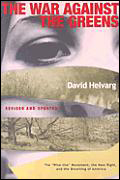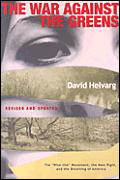
The War Against the
Greens, by David Helvarg,
Johnson Books, 384 pgs.,
2004 revised edition.
In 1988, the Wise Use movement was founded out of fear that George Bush Sr. was going to live up to his campaign pledge to be “the environmental president.” This cabal of anti-environmental activists, organized by federally subsidized industries dependent on public lands, issued a natal document, the Wise Use Agenda. It called for, among other things: drilling the Arctic National Wildlife Refuge, logging Alaska’s Tongass National Forest, opening wilderness to energy development, gutting the Endangered Species Act, and privatizing national parks. Today, the reactionary Wise Use Agenda has become the environmental policy of the administration of George Bush Jr.
One of Wise Use’s major contributions to politics has been its deliberate distortion of language, the adaptation of green-sounding names as industry camouflage: the Environmental Conservation Organization (wetlands developers), Concerned Alaskans for Resources and the Environment (the timber industry), and the Greening Earth Society (coal-fired utilities arguing the benefits of global warming). Today, the administration’s anti-environmental legislation goes by names like “Healthy Forests” and “Clear Skies,” while a combination of industry lobbyists and true believers argue that the same unfettered markets that gave us choking smog and burning rivers in the past have been transformed into the “new environmentalism” of the 21st century. I recently read a government energy report that talked of “the sustainable use of non-renewable resources,” and attended a Boston conference where I met consultants who help developers deal with “environmentally challenged sites.” Translation: wild places containing rare and endangered species or legally protected wetlands.
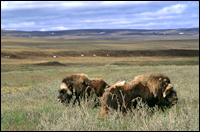
Musk oxen make merry in the Arctic
Refuge.
Photo: Ken Madsen.
Early in the Bush-Cheney administration, the vice president argued that though conservation might be a “personal virtue,” it is not “a sufficient basis for a sound, comprehensive energy policy” (which, of course, no one had argued that conservation alone was). The White House energy plan did offer a billion dollars to develop renewable power sources, but only if the money came from revenues generated by drilling the Arctic Refuge. That sounded like a gleeful spin on the Wise Use agenda, more red meat for the far right’s political base. By 2004, Energy Secretary Spencer Abraham was promoting development of hydrogen fuel-cell technology. The administration plan differed markedly from a plan being promoted by the European Union. While the Europeans envision hydrogen fuel-cell storage systems built on renewable energy sources like wind and solar, the Bush plan calls for the hydrogen to be generated by nuclear and coal-fired power plants. The difference, of course, is whether you see hydrogen fuel cells as part of a necessary transition strategy out of a carbon-based economy or merely as a neat new technology for charging up your SUV.
In the immediate wake of 9/11, the American public appeared ready to make sacrifices and embrace change as they reconsidered their obligations as citizens of a democracy. Instead, the president went on TV and suggested we go shopping. While a few politicians like Sen. John Kerry and media outlets like USA Today argued it was time to move beyond oil and the corrupt terror regimes that produce it, major environmental organizations scrambled to avoid any negative references to the commander in chief. Partly as a result of this timidity, the critical mass needed to mobilize the public failed to materialize. Seeing themselves as hard-headed pragmatists, George Bush, Dick Cheney, and their neo-conservative friends Donald Rumsfeld, Richard Pearle, and Paul Wolfowitz believe we really don’t need to eliminate our dependence on fossil fuels from repressive and unstable regimes like Saudi Arabia and Venezuela. Rather, we need “unilateral” policies to secure and supplement these supplies, even if that means the military occupation of Iraq and industrialization of America’s last wild lands and waters.
In the face of a scientific consensus that human-caused climate change is real and under way and will result in up to a 10 degree Fahrenheit warming and a two- to three-foot sea-level rise by the end of this century, the administration continues to follow the Wise Use path of denial and denigration. They insist that creating incentives to reduce greenhouse pollution (as Europe has done) would severely damage the U.S. economy. You can almost hear the whaling barons of the 19th century arguing that the end of whaling will mark the end of mechanization as industry’s whale-oil lubricated machines grind to a halt. Of course, the introduction of “rock oil” or petroleum actually resulted in the unprecedented growth of the U.S. economy, just as the introduction of renewable-energy technologies is likely to lead to a global expansion of entrepreneurial innovation, competition, and enterprise. Just before the turn of the 21st century, I visited a couple of deep-drilling oil rigs far out in the Gulf of Mexico. It was a loud, thrilling experience watching the platforms’ roughnecks and roustabouts pulling energy from far below the earth and the deep blue sea. It was the kind of heroic but dated scene you might have encountered had you boarded one of the last wooden whaling ships at the turn of the 20th century.
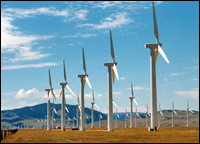
The future of energy production —
or not?
Photo: NREL.
Unfortunately, by favoring their own outmoded petroleum industry, George Bush and Dick Cheney may be undermining America’s competitive position in the world. Today, European energy companies like Shell and BP are investing billions in new energy technologies. Shell believes that solar and other renewables will constitute a third of all new energy production by 2050, while BP’s CEO thinks that year will see 50 percent of global energy demand met by non-carbon renewables. Even if there are short-term costs and dislocations associated with a rapid energy transition, every decade of delay is certain to multiply other economic and human costs. A recent United Nations “CEO Briefing” prepared by Munich Re, a major European reinsurance company, estimates that worldwide insurance losses from severe weather linked to climate change are now running at $150 billion a year and will soon double. Meanwhile, the U.N. World Health Organization estimates that 150,000 people died as the direct result of climate change in 2000.
I’ve seen and reported on dramatic climate impacts already taking place, from the Antarctic Peninsula to the coral reefs of Florida, Fiji, and Australia. As climate change alters and damages unique habitats and the species that depend on them, it becomes ever more important that we conserve and protect what’s left, and that we fully value the economic, social, and spiritual worth of our last wild places. A wetland that’s not filled in for a shopping center or damaged by water diversions can, for example, recharge a local aquifer in times of drought. It can provide habitat for wildlife and recreation, act as a nursery for marine fisheries, filter pollution, and inspire diverse human cultures, ranging from the Cajun of Louisiana to the “Swamp Arabs” of southern Iraq. What Wise Users fail to understand is that saving wilderness, whole and undivided, is really about saving ourselves.
Only a radical reorganization of the way we see ourselves and our role in the natural world can help turn this backlash around. We need to begin a rapid transition from oil and gas to sun, wind, tides, geothermal, and hydrogen energy. We need to revitalize our urban centers and our sense of community while protecting agricultural lands and greenbelts. Even onetime property-rights strongholds like Boise, Idaho, are now recognizing this by voting for growth limits and open-space protections. We need to strengthen the Endangered Species Act to protect our fellow creatures long before they reach a critical state and to ensure we maintain the full diversity and promise of life on our blue-marble planet. We need to establish global standards for the environment, labor, and human rights at least as strong as those for global trade and banking.
Although it’s no guarantee in and of itself, I’ve seen how democratic change can inspire (and be inspired by) ecological movements in places ranging from Poland to Korea and from Bolivia to Mexico and Chile. Ironically, it’s the undermining of democracy in America by a lobbying and election finance system indistinguishable from brown-bag bribery that now poses the greatest environmental threat to our future. We live in a time when too many politicians and business leaders no longer fear being caught in a conflict of interest because they’ve moved beyond a sense of shame.
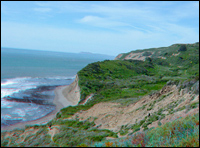
Point Reyes beckons.
Photo: USGS.
Henry David Thoreau once wrote, “Heaven is under our feet as well as over our heads. We need the tonic of wilderness.” As a dedicated diver and bodysurfer, I would add only that heaven is also under our flippers. Whenever the forces of heedless industrial sprawl seem overwhelming, a hike around Point Reyes or a bodysurfing session in the wild waters off Northern California refreshes my spirit. It’s an ice-cold tonic. All I have to do is imagine the noise, traffic, and congestion that aren’t there thanks to the efforts of all those dedicated citizens who came before. Wilderness lands and waters, from New Jersey’s damaged Meadowlands to Alaska’s rugged coastal plains, can revive us and endure with us, but only if we choose to stay engaged in the increasingly politicized struggle necessary to protect them.
Our choice lies either in surrender to the nihilistic backlash that says, “Take what you can get while you can get it,” or in our rededication to a faith that says we can still leave our kids and future generations a good life in a good land. The outcome hangs upon the understanding, heart, and will of the American people. It’s a thin reed of hope, especially in the wake of the 2004 election. Still, it’s worked so far.
